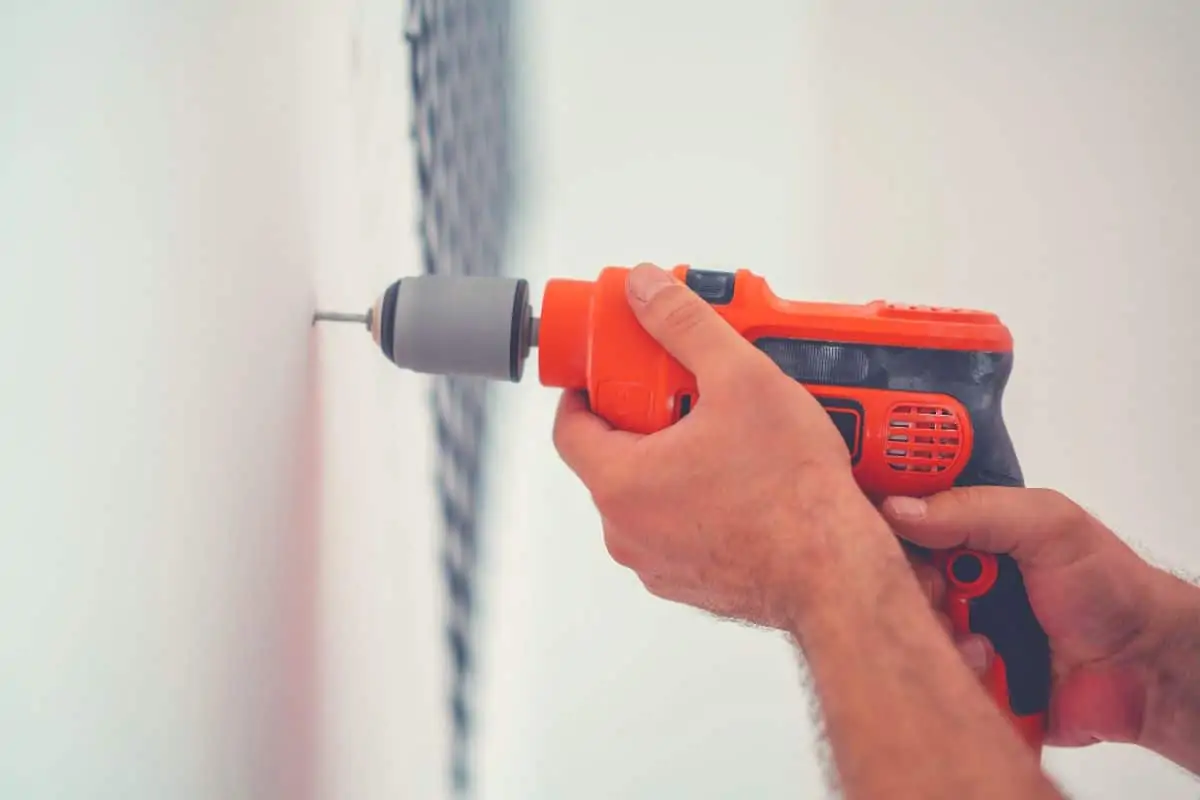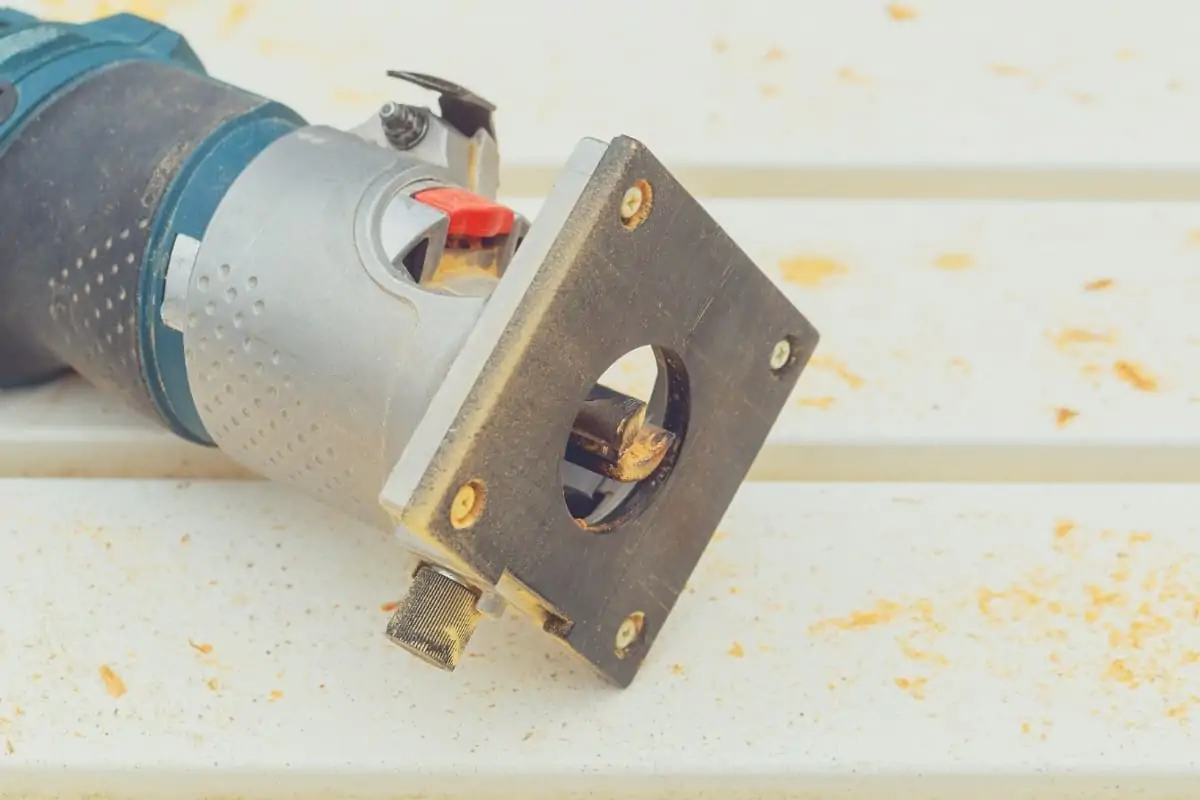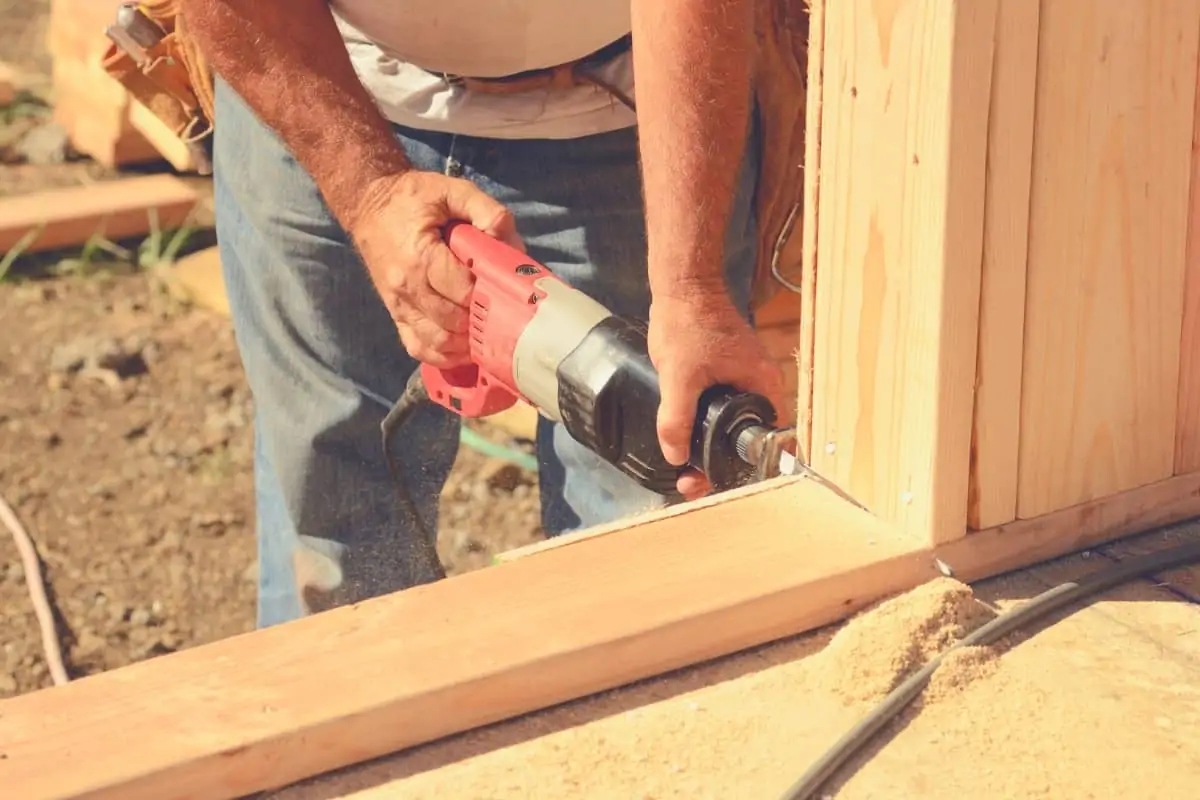Whether around the home or on the job site I can’t think of anything worse than running low on battery mid-project. Perhaps you forgot to charge or the battery is refusing to age gracefully—either way, it forces you to put your project on hold, albeit briefly.
One way to avoid this altogether is by investing in the best corded drill. These drills aren’t limited to battery capacity. This means they are typically more powerful than their cordless equivalents. That said, there are still too many options on the market. It can get confusing.
In this articles I’m going to take you through a list of what I believe are the best corded drills on the market in 2023. Followed up with a guide which is intended to teach you everything you need to know when deciding on your next purchase.
My Top Picks For The Best Corded Drills in 2023
Here’s a quick look at my top five:
- Top Pick – DEWALT DWD112 Corded Drill
- Top Value Pick – Porter-Cable PC600D Corded Drill
- Makita 6302H 1/2 inch Drill
- Metabo D10VH2 3/8 inch Corded Drill
- SKIL 6335-02 7.0 Amp 1/2 Inch Corded Drill
Top Pick – DEWALT DWD112 Corded Drill
I began my search for a corded drill shopping for one that was powerful, light, and comfortable to hold.
Enter the DEWALT DWD112 corded drill. This drill ticks all the boxes in terms of functionality, comfort, and power. For me this has to be one of the best corded drill on the market today.
Its 8-amp motor delivers up to 2500 RPMs, producing enough power for heavy-duty jobs. Despite the power, this drill is versatile enough to handle intricate tasks. It also features a 3/8 inch keyless all-metal ratcheting chuck for enhanced drill bit retention.
This unit is very durable, thanks to a 100 percent ball-bearing construction. However, if anything should happen, DeWalt offers a one-year service contract and a three-year guarantee.
The DWD112 weighs in at 4.1 pounds: It’s light enough to use for extended periods, without requiring too much elbow grease. If you plan to work on a big project, this is probably the best drill for you.
This drill has a soft-grip handle design, making it comfortable to use. It’s a worthy consideration if you’re shopping for a unit for all-day everyday use. Full disclosure, I have very soft hands; I can’t use a drill for too long unless the handle is gentle to the grip.
One thing to consider, this drill is not ideal for driving screws. Due to its speed and power it can prove too much. If you’re not careful it can easily end up stripping a couple of screws.
| Max. Speed | 2500 RPM |
| Amperage | 8.0 |
| Chuck Size | ⅜ inch |
| Item Weight | 4.1 lbs |
| Warranty | 3 year |
Pros
- Powerful enough to handle heavy-duty work.
- Very versatile
- All-metal keyless chuck.
- Variable-speed trigger.
- 100 percent ball-bearing construction
- Lightweight.
- Soft grip handle.
Cons
- May not be suitable for driving screws.
For heavy-duty drill jobs, the DEWALT DWD112 is a fantastic option. It’s light, sturdy, and comfortable. The grip is very gentle on the hands, making it a worthy consideration for around the home or on a job site.
Top Value Pick – Porter-Cable PC600D Corded Drill
Let’s face it; corded drills do get a little pricey.
If you’re on a tight budget, this may be the drill for you. Don’t let the price fool you, though. This unit does not compromise on power. It comes with a high-performance 6.5-amp motor, delivering up to 2500 RPMs.
This unit also comes with several high-end features. These include a two-sleeve 3/8 inch keyless ratcheting chuck, a belt clip, a lock-on button, and a 6-foot high-grade cord. It’s very rare for drills in this price range to exhibit such quality.
The Porter-Cable features a variable-speed trigger, which allows you more control over power output. Combined with its high-torque gear design, you can adjust working speed to suit a wide variety of materials, including wood and steel.
Another thing I loved about this drill was its weight. It weighs in at just 4 pounds, making it quite comfortable to handle. I, however, took issue with the chuck. It’s a little too tight straight out the box.
| Max. Speed | 2500 RPM |
| Amperage | 6.5 |
| Chuck Size | ⅜ inch |
| Item Weight | 4.1 lbs |
| Warranty | 3 year |
Pros
- Powerful 6.8-amp motor.
- Precise speed trigger.
- High-torque gear design.
- Two-sleeve keyless chuck.
- Lock-on button.
- Long durable cord.
- Lightweight.
Cons
- The chuck is quite tight.
- Speed trigger very sensitive.
The Porter-Cable is worth a look. It’s powerful, cheap, and comes with features that are typically reserved for high-end drills. For more on what you can achieve with this drill, follow the link below.
Makita 6302H 1/2 inch drill
Heavy-duty jobs require a heavy-duty tool. Not all drills can withstand the wear and tear of demanding work—I’ve worked through a few myself. If this has been your experience, you should take a look at the Makita 6302H.
This corded drill offers a robust 6.5-amp motor that produces speeds of up to 550 RPMs. Although not as fast as some drills on the list, the lower speed means higher torque. The 1/2 inch chuck requires a key to clamp the drill bit. Although this is slightly more fiddly than a keyless chuck it’s worth the extra effort to ensure the torque is delivered without the drill bit slipping.
Thanks to its industrial metal gear housing, the Makita is designed to last through heavy continuous use. It also comes with a large reversing switch and lock-on button for enhanced operator control. For greater user comfort, it features a belt clip, which conveniently attaches to any holster or belt.
This drill has a side handle that attaches to either side, depending on which hand you use. Even with the effort, left-handed people like me will still have a harder time operating the Makita.
The lock-on and reverse buttons sit on the left side of the drill. Attaching the side handle next to them makes controlling the drill a little tedious. You should get used to it eventually, though.
| Max. Speed | 550 RPM |
| Amperage | 6.5 |
| Chuck Size | ½ inch |
| Item Weight | 4.8 lbs |
| Warranty | 1 year |
Pros
- Sturdy built.
- Heavy-duty 1/2 inch chuck.
- Large reverse switch and lock-on button.
- Relatively light.
- Handy belt clip.
- Moveable side-handle.
Cons
- Left-handers might find it hard to use.
- Not as fast as other drills.
The Makita corded drill is an excellent choice for heavy-duty jobs. It is made of durable materials, and it features a sturdy chuck. This unit is comfortable to operate and quite easy to control, even mid-operation. For more information, please follow the link below.
Metabo D10VH2 3/8 inch Corded Drill
This drill surprised me. It’s easily the most powerful pound for pound drill I have ever reviewed. If you are looking for a light and very powerful unit, this corded drill from Hitachi is an excellent candidate. It weighs only 3.2 pounds but packs quite the punch thanks to its 7-amp motor.
The Hitachi D10VH2 is excellent at most types of drilling jobs in a number of surfaces, including wood and metal. It’s also quite comfortable, thanks to its rubber-coated handle.
This drill comes with a variable-speed dial and a lock-on feature. You simply accelerate to the required speed, push the lock, and the drill maintains the RPM for you. An easy to use push-through reverse button further enhances user control.
One potential downside is the rattling noises it makes when in use. It’s not too loud, but it can be quite irritating before you get used to it. Applying a bit of pressure when drilling should reduce the noise substantially.
| Max. Speed | 2700 RPM |
| Amperage | 7.0 |
| Chuck Size | ⅜ inch |
| Item Weight | 3.3 lbs |
| Warranty | 5 year |
Pros
- Lightweight and comfortable.
- All-metal keyless chuck.
- 7-amp motor.
- Works with different materials.
- Variable-speed dial with lock.
- Push-through reverse button.
Cons
- It makes a rattling noise when in use.
The Hitachi is a good option if you want something light to work with. It weighs in at only 3.2 pounds and is suitable for use on different materials. It also packs quite a punch for its weight class. For more information on the drill and its price, click on the link below.
SKIL 6335-02 7.0 Amp 1/2 In. Corded Drill
This powerful corded drill is suitable for big projects, both at home and commercially. It comes with a 7-amp motor and 1/2 inch chuck.
The SKIL 6335-02 is powerful enough to bore through hard and heavy materials. It also features a variable two-finger speed trigger, allowing for smooth acceleration. Once you’ve found your pace, use the lock-on button, and the drill will maintain the speed.
The Skil is, however, the heaviest drill on the list. It weighs in at 5.1 pounds. For improved control, necessitated by the weight, it comes with a side-assist handle.
That said, you may find the side handle a little too loose for comfort. Ensure that you tighten it to avoid slippage.
| Max. Speed | 950 RPM |
| Amperage | 7.0 |
| Chuck Size | ½ inch |
| Item Weight | 5.1 lbs |
| Warranty | 1 year |
Pros
- Durable drill.
- Includes a 7-amp motor.
- Keyless ½ inch chuck.
- Works with different materials.
- Smooth acceleration.
- Included side handle.
Cons
- It’s heavy.
- The side handle can come loose.
- Two-hands operation.
The SKIL 6335-02 corded drill is durable and suitable for heavy use. It comes with a side handle for enhanced control because it’s a little heavy. This drill features a high performance motor whose speeds can be adjusted to suit different materials. For more on what the SKIL 6335-02 can do, follow the link below.
How to Choose the Best Corded Drills
How did I identify the best corded drills? Well, there is no such thing as the best drill for everybody. We all have unique requirements.
When you’re looking for a drill to use around the home or on a job site, the trick lies in identifying the drills that address your most pressing pain points at the most affordable price. Below are some of the features to consider when shopping for a unit.
The Motor
With drills, you typically have two motors to choose from: non-brushless and brushless:
Brushless motor
A brushless motor uses an electronic circuit board and sensor, as opposed to brushes, to get the shaft spinning. These drills are more energy-efficient, responsive, lighter, and sturdier than brushed variants.
Non-Brushless motor
Non-brushless, or brushed, motors rely on carbon brushes to initiate spinning. The brushes sit on a fixed part of the motor to transfer power to the rotor.
Although these motors work, most drills nowadays tend to have brushless motors since they’re more efficient. Brushed motors are also highly susceptible to wear.
The Power
Corded drills are typically more powerful than cordless drills. This statement, however, doesn’t hold true for every model.
The power output of corded drills is indicated in watts, and not all manufacturers disclose this information. Luckily, you can always calculate it from the motor’s amperage (amp) and voltage (V).
Only remember that a higher wattage isn’t always implicit of higher power output. Torque may be a better indicator if you’re shopping for power.
Wattage is the product of the amperage and the voltage.
Quick example:
Consider a motor rated at 6 amp and 120 V. The wattage here would be:
6 × 120 = 720 Watts.
Most drills in the market come with 6–10 ampere motors with a voltage output ranging from 110 to 120 volts. Wattage, therefore, ranges from 660–1200 Watts.
RPM
Drills express speed in revolutions per minute (RPM). In this regard, you have three types of drills to choose from:
- Single-speed drill: They offer a single speed of operation typically ranging from 2000–2500 RPMs.
- Fixed-speed drills: These drills come with two or three preset speeds. In most cases, the slowest speed is 500 RPMs slower than the fastest speed.
- Variable-speed drills: You can adjust the working speed to your liking.
Torque
Torque describes the force that prompts an object to rotate; it’s the best indicator of a drill’s performance.
Power can be calculated as a product of Torque and Speed:
Power = Torque × RPM
However units are important, you can’t directly work out power in watts from RPM and torque measured in just any units. A full explanation is more than you need to know to choose a drill, but if you’re interested here’s something you should read.
We measure torque in Newton Metres (Nm) or Pound Feet (lb-ft). The higher the Nm/lb-ft, the more power your corded drill delivers, per given speed.
The Clutch
The clutch, torque control, is the adjustable collar sitting right behind the chuck. It contains a series of numbers, which represent the amount of torque the drill produces.
Switch to the lower settings when you’re doing tasks that required limited torque, such as driving screws. Ramp up to the higher settings for heavy drilling tasks.
Most electric drills will also come with overload protection. This is important to ensure that the motor doesn’t stall if the drill bit becomes lodged while drilling. If this does happen the overload protection will kick in and kill the power to the motor and stop it from burning out.
The Chuck
The chuck is the part, which holds the drill bit. The size of the chuck determines the diameter of the drill bit.
When it comes to chuck size, you’ll most likely choose between these three:
- 3/8-inch—ideal for general use.
- 1/2-inch—best for heavy-duty work.
- 1/4-inch—best suited for light work.
The bigger the drill chuck, the heavier it is, but the larger the largest bit you can fit.
For the type of chuck, you have two options: A keyed chuck and a ratcheting keyless chuck.
With a keyed chuck, you’ll need a key to open the chuck whenever the need arises. The main advantage of a keyed chuck is the tighter grip you can get on a drill bit which avoids slipping while drilling tough materials.
Ratcheting keyless chucks, on the other hand, require very little effort and no additional tools to operate. Changing the drill bit in a ratcheting keyless chuck is quick and effortless.
Straight Shank Drill Bits
Most of the common drill chucks and drill bits you’ll come across will have straight shanks and there are many types drill bits to choose from, but I’d recommend you start with these two:
- A set of universal twist drills: perfect for drilling wood, plastic, and metal.
- Masonry drills: suitable for working with bricks, concrete, and mortar.
What are SDS Bits?
SDS refers to the Slotted Drive System. Unlike other types of drill bit and chuck, SDS bits don’t rely on friction alone to transfer power. With a slotted drive system there is a solid mechanical drive between the chuck and the bit, ensuring maximum power transfer while drilling. This is important when drilling through concrete, stone, and other hard materials.
SDS bits are necessary if you plan to work with tough materials. Just remember that not all drills come with this feature, so make sure your drill and bits are compatible.
Comfort and Ergonomics
When the drill is too heavy, you won’t be able to use it for long consecutive drill jobs. Fortunately, when you buy a corded drill, you avoid a weighty battery.
To avoid any work-related strains, I recommend looking for a drill that’s designed for comfort. Go for soft grips and easy-to-reach controls for enhanced comfort and usability.
Warranty
Warranties provide security against manufacturing errors, and in some cases, user-inflicted damage. They also show you how much confidence the manufacturer places on the product. Typically, the longer a warranty lasts, the more confidence a manufacturer has in the item.
Luckily, almost all drills from reputable brands offer some type of warranty. The lack of one should be considered a red flag.
Final Thoughts
Although all the products on this list are worth checking out, I highly recommend DEWALT DWD112 Corded Drill.
It comes with a powerful 8-amp motor, capable of producing up to 2500 RPMs. The drill offers an adjustable keyless chuck that makes it very easy to switch drill bits. It also includes a variable-speed trigger and a comfortable pistol-design grip.
This DeWalt is light, making it very comfortable to use over a long time. If you’ve got an extensive DIY project coming up, this may be the drill for you. It’s easily the best cordless drill in the market today.
If this isn’t the right choice for you I hope you were able to find the best corded drill for you in this list. If not, I’d be interest to hear what you consider to be the best corded drill currently on the market. Comment below!








